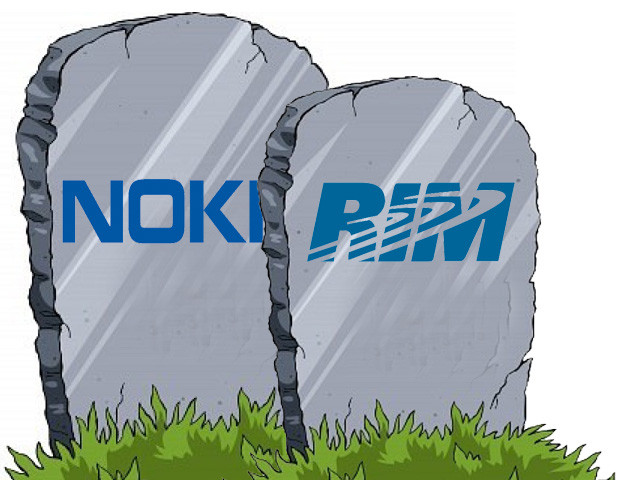Smartphone wars: The battle lines have been drawn
Android dominates, Apple holds its ground while Nokia and RIM have dropped the ball.

The numbers are not good. And I am not just talking about sales or market share right now. That will come later. I am just talking about the fact that Nokia has announced over 10,000 job cuts over the next 18 months. This will bring the total number of planned layoffs to 40,000 since Stephen Elop took over as CEO in September 2010.
The company, which has lost ground to Apple and other providers such as Samsung and HTC, also warned that the second-quarter loss from its phone business would be larger than expected, according to media reports.
Shares have crashed more than 70% since the company announced in February 2011 that it was dropping its own Symbian smartphone operating software and switching to Microsoft’s largely-untried Windows Phone system.
It is fighting fierce competition from Apple’s iPhone and other makers using Google’s popular Android software, including Samsung and HTC.
Nokia is also being squeezed in the low end by Asian manufacturers making cheaper phones - threatening its overall market dominance.
Nokia’s decline was evident in 2011, almost four years after the introduction of iPhone in 2007. iPhone and then Android powered devices smashed Nokia to the extent that it has lost $19 billion in market value in 2011. Debt ratings of Nokia were cut last year by Standard & Poor’s and Moody’s on fears that a change in fortune would take longer time.
Now let’s take a look at some of the numbers. International Data Corporation (IDC) recently released figures on total smartphone operating systems shipped for the first quarter of 2012.
Android continues to be the top operating system for mobile phones, and now accounts for 59% of the market, with an increase of 145% from shipments in the same period in 2011. Samsung phones account for 45.4% of the Android smartphones shipped.
Apple has the second highest number of smartphones shipped, its iPhone taking 23% of the market. This is an increase of 88.7% from the same period in the previous year.
The market share of Windows Phone actually dropped in the first quarter of 2012, at 2.2% as compared to the 2.6% in the previous year. While there is no breakdown between Windows Phone and Windows Mobile sales, it would be safe to assume that the loss in market share was mainly due to the fact that there are no low-cost options available.
It seems that the battle is lost, but let’s give it two more quarters. In the last quarter of this year, you have the Windows Phone 8 launch, which should see new devices breach the two year technology gap between current Windows Phones and their Android and iOS competition.
However, if there is no dramatic shift in consumer orientation, I don’t feel much will happen to turn around Nokia’s position in the smartphone market.
Meanwhile, with Nokia’s move to the Windows Phone platform, sales of Symbian OS powered phones, mostly Nokia’s, continue to slide now making up just 6.4% of the market.
The time gap between Nokia’s announcement that it was migrating to the Windows Phone platform and its actual release of Windows Phone devices was described by many analyst as too long. Nokia’s Windows Phone 7 roll-out has not been fast enough to convince all Symbian phone users to move to Nokia Windows phones. Even if all existing Nokia users migrate to Windows Phone devices, this would give Windows Phone a market share of about 9%. Still, I guess 9% is not a bad place to start.
The real casualty of this war, it seems, is RIM. The BlackBerry OS share in the market is now just 6.4%, which is 29.7% lower than its shipments in the first quarter of 2011. Like Nokia, it looks like its transition to BlackBerry 10 has been a bit too slow.
BlackBerry’s strength lies in its associated services rather than the hardware itself. As its market shrinks so do the number of users on its services.
Having lost 29.7% year on year, with BB 10 handsets another six months away things really look bleak for the BlackBerry OS.
So does it look like the Smartphone wars are over? Yes it does. It would take a great leap of faith to assume that Windows Phone will suddenly break the stranglehold that Android OS and iOS has on the market. If the numbers are any indication that the fact that market share for both Windows Phone and BlackBerry has fallen in the first year while Android and iOS are growing at a fast pace shows that users are not really looking for a new OS. The battle lines have been drawn and so far it seems as if BlackBerry and Windows Phone are just bystanders.
Published in The Express Tribune, 25th, 2012.



















COMMENTS
Comments are moderated and generally will be posted if they are on-topic and not abusive.
For more information, please see our Comments FAQ